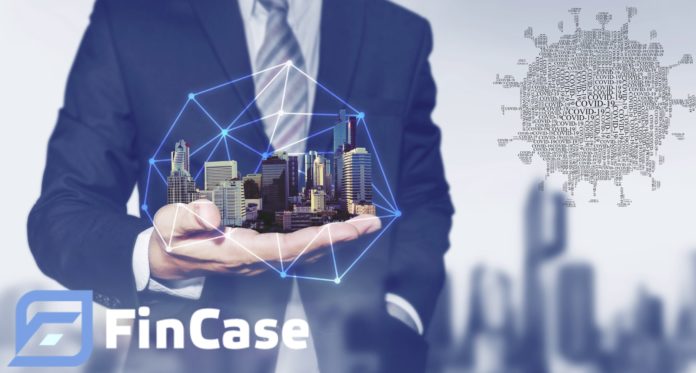Now comes one of the most difficult periods for the businesses when the wave of diseases begins to fall, and we see its devastating consequences. How the post-pandemic crisis affects business, which businesses benefit in the uncertain times, what needs to be taken into account for successful work and development, and what trends await real estate market participants – all of these issues are being raised in the interview with Maxim Bobyrev and Dmitry Tsyplakov.
Maxim Bobyrev is the founder of Fincase, owner of 7 businesses, investor. Dmitry Tsyplakov is the CEO/Product Manager of Fincase.
Fincase is a rapidly growing startup using Artificial Intelligence and Machine Learning for transforming real estate appraisal market. Fincase innovative service Scoring Analyses of Value helps to analyze big data and make profit of investing in property.
Fincase – #1 Property Technology Company across Russian market
In what way has your business strategy changed since the pandemic?

Maxim Bobyrev (MB) B: Apart from affecting the human body, the virus also impacted absolutely all areas of life and business. The world has changed in a few months. People have stopped being blindly afraid, but they will be anxious and cautious for a long time. Offices are closed, companies are going online, stores are forced to move out, the tourist industry and, as a result, rental of rooms, apartments and sleeping berths have come to a standstill. The construction is suspended. At first glance, the real estate market, so stable and most profitable as if it was only yesterday, became unprofitable, unpredictable and unpromising. But I have been through many crises and see the prospects for development in what we are experiencing now.
Any crisis is an opportunity to make a qualitative leap, so for PropTech it serves only as an accelerator in development.
What do you see the future of the real estate sector after the pandemic to be like?
MB: Companies connected with the real estate market have only two options left: to close down or to quickly adapt to new realities. We bet on the latter, recalling Lego, which was created during the Great Depression, and Adidas, which started making slippers immediately after the First World War.
This period of crisis and uncertainty is happening in the midst of the biggest wave of innovation that has engulfed the entire real estate industry. In particular, the introduction of artificial intelligence as an instrument to select the perfect office space, warehouse or apartment for living. In other words, we continue to focus on quickly meeting the true needs of a particular client, while other companies are only now trying to move on from the “classic” square meters and the number of rooms criteria to a more serious analysis of each object.
What helps your company move forward and grow during the crisis?
Dmitry Tsyplakov (DT): We respond quickly even to the micro-changes in demand. It is very important to understand now that there can be no demand for premises, but the criteria for selecting them are still quite different. If before daily housing in the capital was rented mainly to foreign guests with their demand for modesty and functionality, now an influx of domestic tourists, who prioritize very different values is expected. If stores have gone online, they need to store their goods in a place that makes it convenient to quickly deliver them within the city or to be situated near a delivery service department or Russian Post to send parcels around the world.
All these subtleties have long been taken into account, so it is easy for us to adapt to new requests.
The main product of Fincase – Scoring Analysis of Value – allows you to get the market value of a real estate unit in a few seconds with the help of the mechanisms of machine learning, mathematical modeling and semantic analysis. The database with 15 million comparables allows you to analyze the cost taking into account many coefficients. Based on it, the system analyzes and considers any changes in price dynamics, which are then reflected in customer reports.
Are you planning to change your product to meet the demand transformation?

DT: The Fincase analytical department has launched a comprehensive study that will analyze
real estate market changes related to coronavirus: the dynamics of market indicators based on big data and new consumer preferences. We will also conduct expert interviews with the market leaders. Based on the results of the study, we will understand what data is needed to improve the system.
According to Knight Frank, in recent months, the situation of uncertainty has led to a rush in the market of high class housing (A- and B-classes). In these segments, sales growth was 10% and 40%, respectively. Among upscale residential complexes, investment-attractive properties are those with a small volume of supply, unique in terms of location and product. The obvious advantages of such housing further underline the importance of the characteristics brought to the fore by the pandemic. For example, the ability to walk in your own square, water and air purification, apartments with terraces and bay windows. Security, privacy, limited access, provision of the necessities directly at the location are the characteristics that will only increase the attractiveness and cost of the premium housing over time.
Another example is that after self-isolation it is important to have an isolated yard or a park area nearby, which can directly affect the cost. As soon as we get the confirmation of this hypothesis, we will add it to the adjustments when comparing analogues. In doing so, the adjustments for current indicators may change, and their value may become lower.
Our task is to study the market from the point of view of demand, identify new factors, update data with this in mind, and, based on this, change the algorithm for calculating the estimated cost.
The results will be the basis for scaling our product, so that the user gets the most reliable information and makes the right investing decision.
What is the main trend of the real estate sector in the new reality?
MB: One of the main trends in the real estate market is the security of agents, owners and clients. Virtual real estate valuation is becoming a common practice and is unlikely to become obsolete after the self-isolation measures are lifted. In the international market, not only the viewing itself, but also the transfer of money and signing contracts online is a common practice. But that’s not all. The need for security is reflected in the real estate itself. Landlords are required to equip their offices with the ability to work remotely and track contacts at the workplace. Now people ask to convert the well-loved openspaсe into individual cubicles to isolate employees from each other. Another criterion for increasing the cost of real estate is the availability of robotic cleaning and disinfection of premises.
Combining such knowledge about the object, current market information and our technologies allows us to give a very clear idea of the actual cost of real estate now and in the future, and most importantly, to determine at what time it is best to start the marketing of each object, that is, when this object will have the highest demand.
While some areas may require a rethinking, eventually, the interaction of the real estate industry with technology should serve as a catalyst for further development of the entire industry.





















